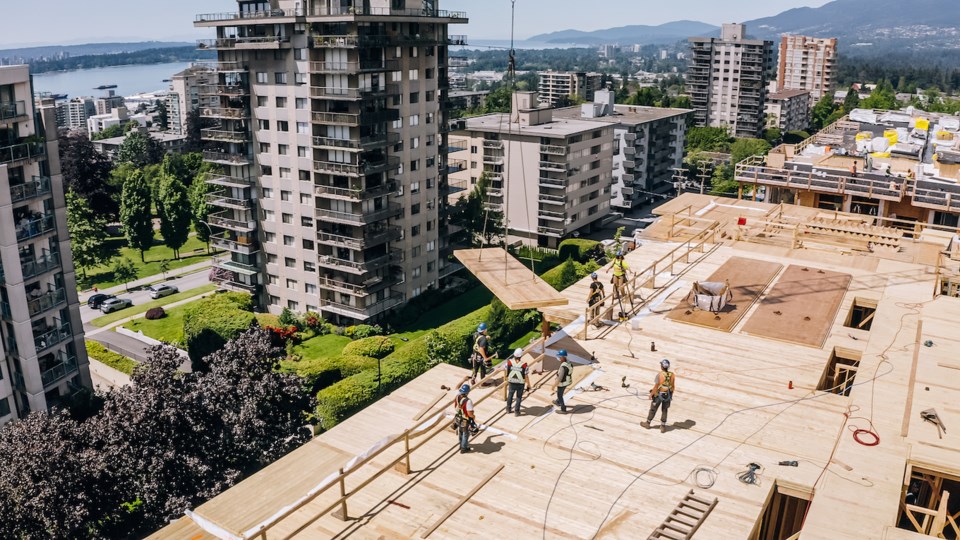In a May 27 unanimous vote, Vancouver City council approved a staff recommendation to allow mass-timber construction up to 12 storeys for residential and commercial uses, doubling the current height limit of six floors.
The city joins 13 other B.C. municipalities that now endorse taller wood buildings more than a year after the B.C. building code was modified to allow the tall wood buildings.
The change meant a modification of the Vancouver Building By-Law.
“Accepting taller mass timber construction with the building bylaw will make it easier to build with low carbon materials, support future housing affordability and represents an important first step in reducing our carbon pollution from construction,” says the city staff report, noting the manufacture, use and disposal of construction materials represent 11 per cent of global carbon pollution.
Mass timber is made of smaller pieces of lumber, which are laminated together to form engineered structural components for floors, walls, columns and beams.
The timber is significantly more fire resistant than light wood construction, either by coating with a gysum covering or other treatments.
Studies of mass timber projects have shown a reduction of carbon pollution by 25 per cent to 45 per cent or more during construction. The buildings are also more energy efficient, with wood being a natural insulator.
Construction of buildings using heavy timber is not new to Vancouver, with some of the city’s oldest large buildings built with the sturdy lumber.
More recently, mass timber projects have been approved or are being built at 1250 West Hastings Street and 2150 Keith Drive, home of the new Nature’s Path head office, designed by Dialog Architects. Dialog's wooden structure have been specifically engineered to meet two-hour fire resistance rating without requiring gypsum coverings. The University of B.C. campus, which does not fall under council’s jurisdiction, is home to one of the tallest mass timber buildings in the world, the 18-storey Tallwood House at Brock Commons.
Kelowna, which approved tall timber construction last year, expects to see 12-storey mass timber hotel, the Ramada by Wyndman Hotel, ascend next year.
Alberta approved 12-storey wood construction province wide last year.
The leading B.C. developer for cross-laminated timber (CLT) construction is Vancouver-based Adera Development, which uses its proprietary Smartwood CLT system exclusively.
Adera recently completed a six-storey wood projects in Coquitlam and has a second nearing completion in North Vancouver, which is among the B.C. cities that endorses 12-storey wood towers.
Adera has 500 homes under construction using SmartWood, according to Eric Andreasen, senior vice president and senior operational manager of Adera Development Corp.
Adera’s support of mass timber construction has led to B.C. becoming a leader in its manufacturing. Back in 2008 Adera was an original investor in Penticton’s 60-year-old Structurlam Mass Timber Corp., which is now booked solid with orders as the largest mass-timber maker in North America.
Structurlam, in fact, recently published the first U.S. guide for building with mass timber and is currently completing a US$90 million, 280,000-square-foot manufacturing plant in Conway, Arkansas, which opens in June 2021. Structurlam also recently signed a contract with Walmart to build the retail giant’s new Bentonville, Arkansas headquarters, a campus of up to a dozen buildings, all built with mass timber and cross-laminated timber, and covering more than 2.5 million square feet, says Structural CEO Hardy Wentzel.



